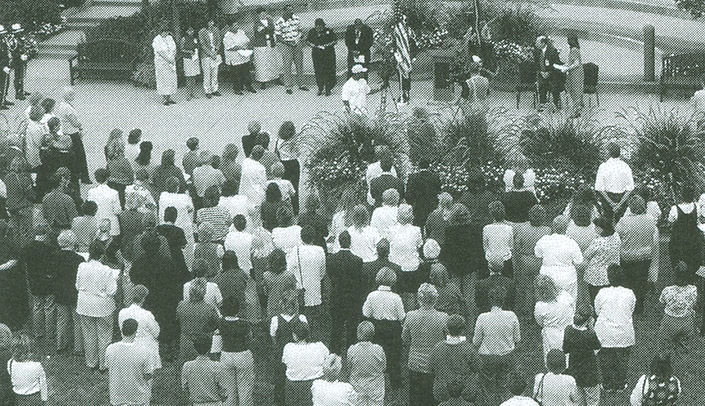Twenty years ago, on Sept. 11, 2001, life changed. UNMC and its staff reacted to events on this day just as many did across the nation. They mourned. They helped. They prepared for a different future.
On Sept. 13, the campus held an ecumenical service to mourn and commemorate the lives lost in the attacks. Over 300 people attended the service, where Chancellor Harold Mauer, MD, spoke. The UNMC/Nebraska Health System (now Nebraska Medicine) choir sang "God Bless America" and "Let There Be Peace." The Benson High School ROTC Color Guard attended the service, displaying the American flag.
In the days that followed, campus public safety increased the number of officers on patrol duty and emphasized wearing ID badges. Departments across campus were encouraged to review emergency procedures with staff. And there was an effort to fight stereotyping.
Individuals connected to UNMC shared their expertise at the site of the disaster. Eric Mueller, PharmD, a 1997 graduate of the College of Pharmacy, worked for the U.S. Public Health Service. He was a member of the Commissioned Corps Readiness Force (CCRF), a mobile unit of medical professionals to assist in emergencies. In November 2001, Dr. Mueller worked at Ground Zero providing pharmaceutical care to the workers sifting through and cleaning up the debris from the collapsed World Trade Center towers. The cleanup site was dangerous, full of jet fuel and mangled steel. From inside a tent, he dispensed medication and medical supplies. He saw cleanup workers suffering from smoke inhalation, burns, cuts and fractures.
The Department of Psychiatry’s Robin Zagurski spent two weeks in New York City from the end of September into early October. She worked at a Red Cross family service center on Pier 94, serving people displaced from their homes or jobs. Zagurski saw the worst despair and pain and the best in resilience and kindness.
How did the 9/11 attacks change UNMC? Campus reevaluated safety. UNMC created the position of biosafety officer, first held by Peter Iwen, PhD. In this position, Dr. Iwen inventoried bacteria, fungi and toxins at UNMC, Nebraska Health System (NHS), and the Nebraska Public Health Laboratory. The University of Nebraska Bioterrorism Preparedness Task Force was formed and chaired by Chancellor Mauer. The task force worked to coordinate efforts related to bioterrorism and security across all University of Nebraska campuses.
UNMC colleges updated curriculums as well. The School of Allied Health Professions (now the College of Allied Health Professions) added information about chemical and biological agents into its instruction. The College of Nursing focused on triage, rapid needs assessment, direct care and crisis intervention that nurses would provide in a terrorist attack. Students became familiar with the Omaha Metropolitan Medical Response System, a group that worked to prevent terrorist attacks, composed of government, medical and safety leaders. Students in the College of Medicine received lectures on biological warfare and procedures to alert public health officials and law enforcement.
One year later, on Sept. 11, 2002, UNMC and NHS employees gathered again to remember and to pay tribute to the lives lost in New York City, the Pentagon, and Shanksville, Pennsylvania, and to the members of the armed forces. May they never be forgotten.

Erin – thank you for this sensitive and beautifully written review of an event that is etched in our collective memory. Like the assassination of President John F. Kennedy, each of us remembers exactly where we were and what we were doing the morning of September 11, 2001.